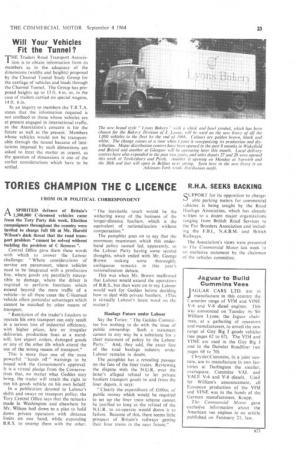P - 1 A SPIRITED defence of Britain's
Page 25

If you've noticed an error in this article please click here to report it so we can fix it.
1,300,000 C-licensed vehicles came from the Tory Party this week. Election campaigners throughout the country were invited to charge full tilt at Mr. Harold Wilson's dark threat that the road transport problem "cannot be solved without tackling the problem of C licences ".
Central Office gave them these words with which to answer the Labour challenge: " Where considerations of service are paramount, where vehicles need to be integrated with a production line, where goods arc peculiarly susceptible to damage, where the driver is required to perform functions which extend beyond the mere traffic of a vehicle—in all these cases. the C-licensed vehicle offers particular advantages which cannot be matched by other means of transport.
"Restriction of the trader's freedom tooperate his own transport can only result in a serious loss of industrial efficiency, with higher prices, late or irregular deliveries, production lines at a standstill, lost export orders, damaged goods or any of the other ills which attend the use of the wrong means of transport."
This is more than one of the most powerful hands off" warnings to be issued with the Government's approval It is a virtual pledge from the Conservatives that, no matter what Geddes may bring, the trader will retain the right to run his goods vehicle on his own behalf.
In a publication devoted to Labour's shifts and sways on transport policy, the Tory Central Office says that the remarks made in Washington and elsewhere by Mr. Wilson boil down to a plan to hold down private operators with distance limits on one hand, while expanding B.R.S. to swamp them with the other. "The inevitable result would be the withering away of the business of the longer-distance hauliers, which is the equivalent of nationalization without compensation."
The pamphlet goes on to say that the enormous resentment which this underhand policy caused led, apparently, to the Labour Party having some second thoughts, which ended with Mr. George Brown making some thoroughly ambiguous remarks in this year's nationalization debate.
This was when Mr. Brown reaffirmed that Labour would extend the operations of 13.R.S., but then went on to say Labour would wait for Geddes before deciding how to deal with private hauliers. (This is virtually Labour's latest word on the matter.)
Haulage Future under Labour Say the Tories: "The Geddes Committee has nothing to do with the issue of public ownership. Such a statement cannot in any way be a substitute for a clear statement of policy by the Labour Party." And, they add, the exact fate of the road haulage industry under Labour remains in doubt.
The pamphlet has a revealing passage on the fate of the liner trains_ Reviewing the dispute with the N.U.R. over the latter's alleged refusal to let private hauliers transport goods to and from the liner depots, it says: "Clearly the expenditure of £100m. of public money which would be required to set up the liner train scheme cannot be justified so long as the refusal of the N.U.R. to co-operate would doom it to failure. Because of this, there seems little prospect of Britain's railways getting their liner trains in the near future."
































































































































